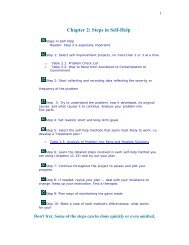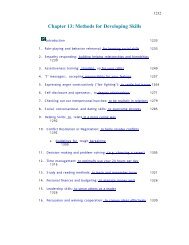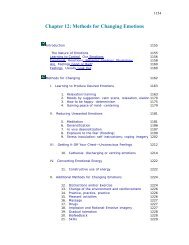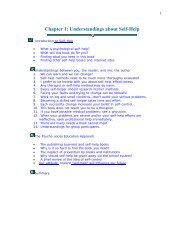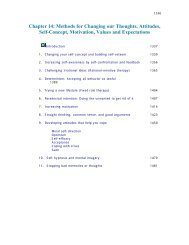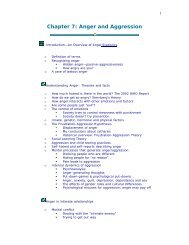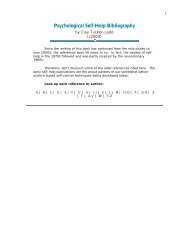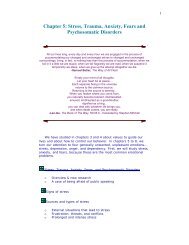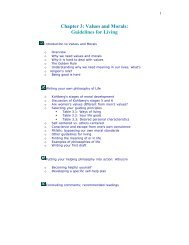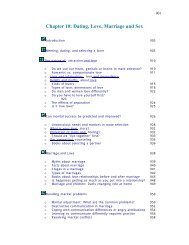Methods for Changing Behaviors - Psychological Self-Help
Methods for Changing Behaviors - Psychological Self-Help
Methods for Changing Behaviors - Psychological Self-Help
Create successful ePaper yourself
Turn your PDF publications into a flip-book with our unique Google optimized e-Paper software.
hard enough to get into medical or law or graduate school, or avoiding<br />
dealing with shyness which eventually prevents dating, marriage and<br />
children.<br />
When one neglects unpleasant but needed immediate tasks, one<br />
should schedule frequently and reward heavily the goal-directed<br />
behaviors. At the same time, one can also focus on learning to enjoy<br />
the behaviors that leads to your long-term goals, e.g. study or work in<br />
ways you enjoy, use your new knowledge, take pride in doing well.<br />
In summary, there are various ways of increasing the probability of<br />
good outcomes--avoid temptations, make it easy to do the right thing,<br />
practice the desired behavior until it becomes a habit, repeatedly<br />
remind yourself of the good and bad consequences of your behavior,<br />
give yourself inspirational pep talks, carefully observe and actually<br />
record your behavior, and feel proud and get support from friends,<br />
coworkers, relatives, or whomever you can. The other behavioral<br />
methods of self-control in this chapter will help you make these<br />
changes.<br />
You need to be aware of the complexity of behaviors. You need to<br />
know yourself and what rein<strong>for</strong>cements have you under control. Are<br />
you a slave to strong habits? Do you give due weight to future<br />
outcomes or do you pretty much live <strong>for</strong> the moment and avoid<br />
unpleasant tasks? Do you succumb to old habits or focus on the<br />
"goodies of the moment" and <strong>for</strong>get the more important distant goals?<br />
Do you neglect distasteful chores, like doing a report or buying a new<br />
battery <strong>for</strong> your old car, leading to dire consequences? These are<br />
<strong>for</strong>mulae <strong>for</strong> failure. If you overlook or minimize the probable bad<br />
consequences of bad behavior (even though it may be fun right now)<br />
or play down the possible good consequences of good behavior (even<br />
though it may be hard unpleasant work), you need to learn how to<br />
accentuate the importance of those long-term outcomes! One needs to<br />
keep his/her eyes on the big long-range consequences (see motivation<br />
in chapter 14).<br />
When we are fully aware of all the consequences of our actions<br />
(the resulting rein<strong>for</strong>cement), we can have more self-control and more<br />
payoffs in the long run. This isn't easy. But rewarding desirable<br />
behavior, as now described in this method, is very important.<br />
Purposes<br />
Rewards can be used any time a new response--behavior, thought,<br />
feeling, attitude, skill--is needed to overcome a problem or to be a<br />
better person. Rewards can be used:<br />
· To motivate you to do a desired behavior that isn't a self-sustaining<br />
response yet. Eventually, a new behavior should yield enough natural<br />
payoffs to sustain itself.<br />
· To encourage you to keep trying to find a way to a goal.<br />
1126



